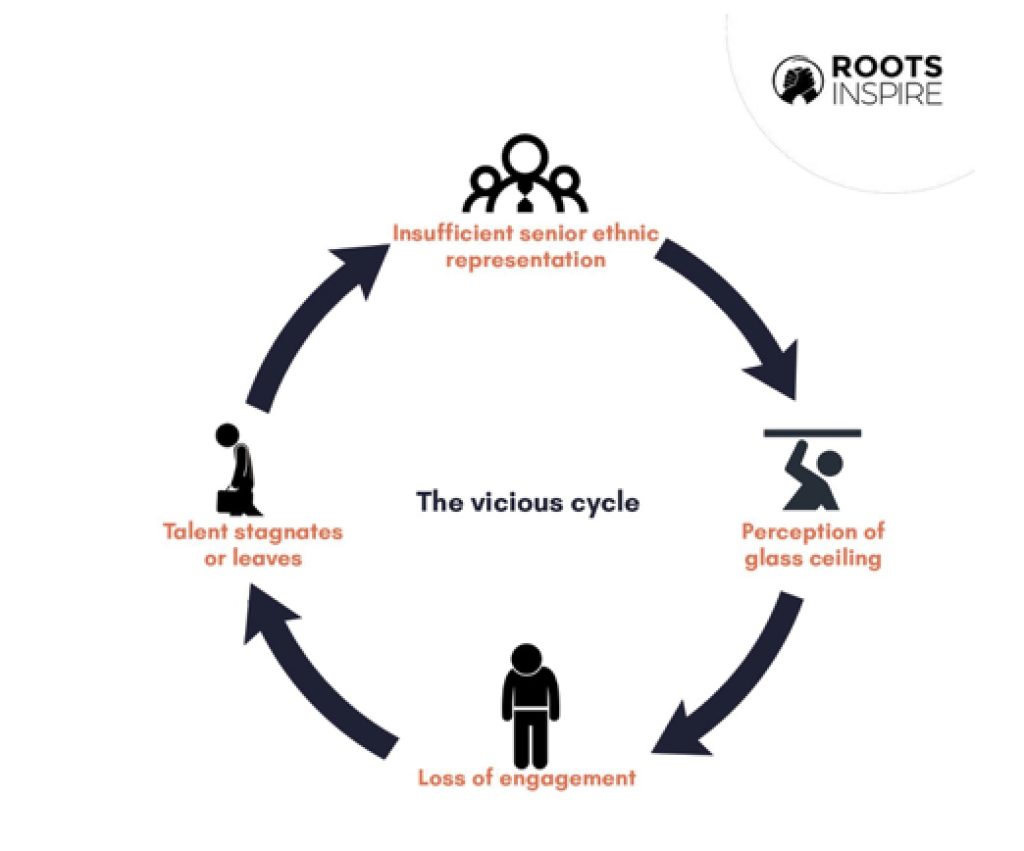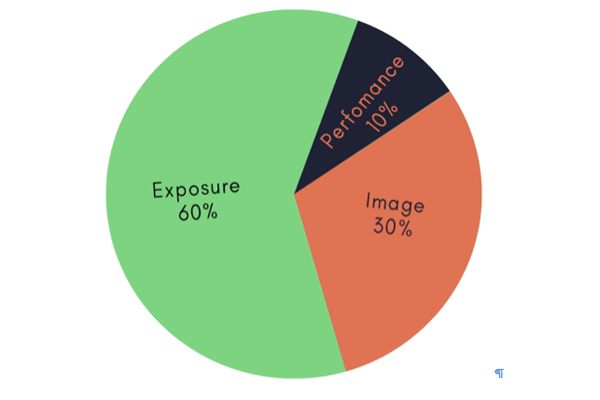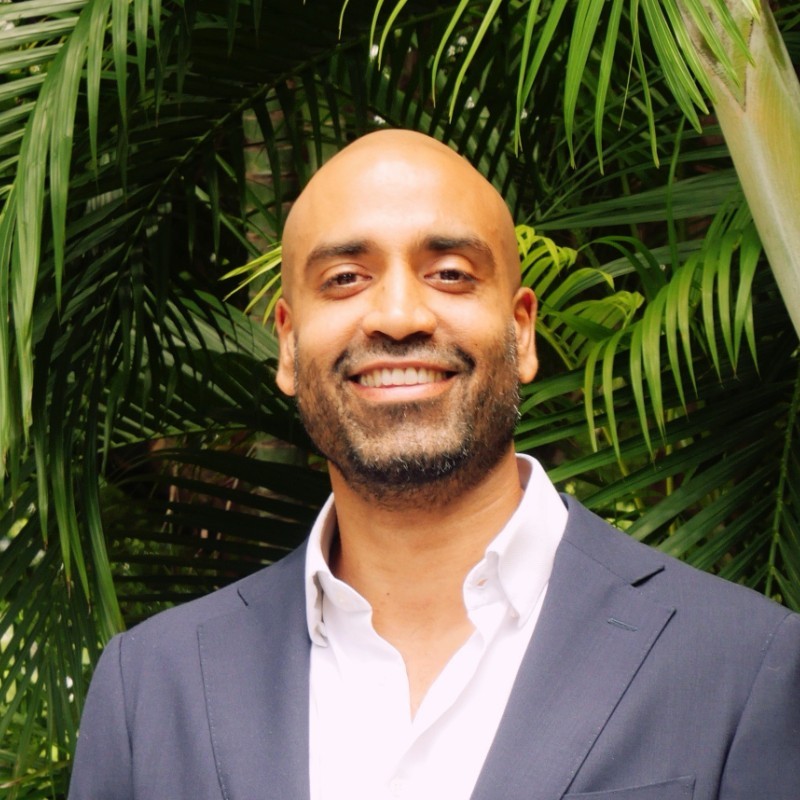In this week’s guest column, Co-founder of Roots Inspire Sergio Panday explains why companies still lack Black and Ethnic talent at the top; and how they can break the vicious cycle of this lack of diversity to diversify their senior leadership ranks through the right mentors and programmes.
“It’s 10 pm, and again, I’m sitting here to make sure this presentation can be sent out tomorrow morning. My boss is super happy with me, but I doubt it’s even worth it. When will I get a real promotion? I would love to lead the team someday, but somehow I doubt that’s even possible. I mean, take a look around, there is no one at management level that even looks like me…”
The doubt, the frustration, the perception of a glass ceiling, it’s emotions like these that ethnic talent deal with when trying to progress their careers. Ask any ethnic professional in a large organisation, and they will confirm that this doubt is a returning factor. The higher they climb the ladder, the fewer the role models, the larger the doubt. Representation matters – you can’t become what you can’t see – but, in most large organisations, the senior layers look very uniformly white (granted, sometimes with a dash of “but we have such-and-such”).
LACK OF SENIOR ETHNIC REPRESENTATION
This lack of senior ethnic representation causes a vicious cycle, where companies want to diversify their leadership, but there is no leadership bench/pipeline to pick from. Their ethnic talent is either not visible enough as they’re busy finishing that next presentation instead of having that chat with their boss’ boss at the coffee machine; or their talent quits in the process; often for a job that is below their potential, just because they feel they have a better shot at breaking through somewhere else.
This vicious cycle means that at a leadership level, it will remain uniformly White; and all those diversity and inclusion recruitment initiatives go to waste, when those new ethnic recruits again don’t see themselves represented, get demotivated and quit.
“So then hire ethnic professionals at a leadership level,” I hear you say? That is indeed what is happening. A carousel of the same people being moved around to give some colour to leadership teams. Unfortunately, though, that one exception is often not enough to trigger real belief and engagement with ethnic staff, especially if that one exception is an outside hire.

BREAKING THE VICIOUS CYCLE
So how do we break the vicious cycle? If it was easy, it would have happened a long time ago. Breaking the vicious cycle is hard work and has many different angles to it. There are five important pillars where organisations can take control:
1. External role models
If you do not have sufficient role models internally, there is still the option to get them externally in the form of speakers, trainers or mentors. The point of this is to firstly, inspire your talent and provide access to the knowledge of those who preceded them; and secondly, to show that you care, are acknowledging the problem and acting upon it.
2. External peer groups
To be “the first” or “the only” is often a lonely experience. A peer group of ethnic talent that is going through the same motions can be incredibly valuable. The benefit of an external peer group versus an internal peer group is that your ethnic talent will find out that the grass is not greener on the other side; and that those in other organisations are facing similar challenges that they have to find solutions for.
3. Visibility and soft skills
Building senior relationships, understanding corporate politics and most importantly, becoming visible towards senior management become crucial skills at senior levels. When you feel somewhat out of place, a natural tendency is to try to blend in, close off your personal life and let the quality of your work do your talking. This strategy is often successful for ethnic talent in the early steps of their careers; however, it typically stalls their careers when they get to a senior level. Additional guidance and training can help break these tendencies and help talent flourish at a level that matches their true potential.

According to Harvey Coleman’s book Empowering yourself, the organisational game revealed performance counts for 10% of your success, image 30% and exposure an eye-popping 60%. Source: Roots Inspire
4) Sponsorship programmes
Mentorship programmes are great to work on personal development. To be effective, they require an environment where it is truly safe to let your guard down and be vulnerable. For internal programmes, sponsorship is often much more beneficial. The best sponsorships are earned and not given. However, for a group that has difficulty finding sponsors themselves a more formalised approach can kick-start these important relationships.
5) Recruitment is not enough
Diversity and inclusion recruitment initiatives without a long-term development plan for ethnic talent can be a waste of resources. Understanding that a career as an ethnic professional is a vastly different experience at all levels of the organisation, is an important first step in maximising the potential of ethnic talent. Deliberately and continuously investing in the development of your ethnic talent will ensure retention and build your bench of diverse leadership.
EMPLOYER OF CHOICE
The good news is that once an organisation can break the cycle, things will actually start to reverse. Outside ethnic talent will see your senior representation, and you will become their employer of choice. Your ethnic talent across different layers in the organisation will be more engaged, confident, and therefore visible. From here, your ethnic leadership bench will start to fill itself and you won’t require further intervention.

ABOUT THE AUTHOR
After an international career as a corporate banking executive, Sergio Panday is determined to increase ethnic diversity at the senior corporate layers. Together with over 50 ethnic corporate leaders, He co-founded Roots Inspire as a leadership development platform for ethnic corporate talent.
In the journey of establishing the Roots Inspire programme, Panday has been in continuous dialogue with both ethnic corporate leaders and upcoming ethnic talent. Next to his own experiences in the banking sector, these dialogues have provided him with strong insights into what is required to advance your career as an ethnic professional; what barriers individuals and organisations face; and how to overcome them.
Roots Inspire is a leadership development platform for ethnic corporate talent established on the principles described in this article. It transfers the knowledge from over 50 ethnic corporate leaders to upcoming talent through its leadership mentoring programme for top employer brands such as Unilever, CBRE, Rabobank, ABN AMRO, Baker McKenzie and Oliver Wyman.
BREAKING THE BARRIERS
Leadership coach and author Anthony Francis also provides key insights on what’s preventing Black and Ethnic Minority professionals from ascending into senior roles, and how to overcome those barriers to improve diversity in leadership. Click here to read more.






































